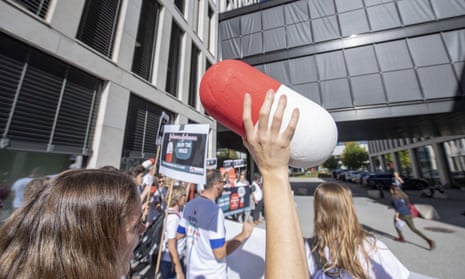Pharmaceutical giant Johnson & Johnson has struck a deal to allow generic versions of its tuberculosis drug to be supplied to low-income countries – but the deal has been criticised for not going far enough to end the company’s monopoly on global supplies of bedaquiline.
The global patent of the drug ends on Tuesday 18 July, but in a number of countries Johnson & Johnson continues to control the market with secondary patents – for which small modifications are made to a product to extend a patent.
J&J’s decision will allow the Stop TB Partnership coalition to procure and supply generic bedaquiline to 44 low- and middle-income countries through its Global Drug Facility (GDF).
The MSF Access Campaign, which advocates for affordable and available medical treatments, said that while it welcomed the move, it was only a “stopgap” solution, and that the full terms of the agreement needed to be made public. “We remain concerned that J&J retains the global authority to determine access to lifesaving generic versions of bedaquiline in countries with a high burden of TB, even after the expiration of the main patent,” said Christophe Perrin, TB advocacy pharmacist for MSF Access Campaign.
According to MSF Access, J&J’s bedaquiline is the most expensive component of the multi-drug regimen for people with drug-resistant TB, but this could be reduced from $1.50 (£1.15) a day to $0.50.
Perrin said the company should not enforce its existing secondary patents and withdraw any pending applications for more. If it does not, governments should override the patents and seek to buy the drug from generic manufacturers.
“Only by taking these actions will J&J truly demonstrate a commitment to improving global access to bedaquiline and prioritising the health needs of people most affected by this deadly disease over profits accrued through secondary patents.”
The Treatment Action Group (TAG) said the deal “falls short” of demands made by TB patients and that it was using “patent evergreening … to extend monopoly rights over publicly funded innovations”.
“J&J is dodging accountability for how their patenting practices have harmed people with TB and taken advantage of the governments whose investments made this drug possible and those which have purchased bedaquiline at unjustifiably high prices,” the TAG said in a statement.
The GDF’s chief, Brenda Waning, said that the deal will allow them to supply low- and middle-income countries with generic bedaquiline, even where secondary patents – active until 2027 – are in place. “From our perspective, the end point is the same. We can supply to all the countries [under the deal] regardless of patents,” said Waning.
A J&J spokesperson said it uses money made through patents to pay for other drugs to be developed, which generic manufacturers do not usually do.
The spokesperson added: “More and faster innovation is needed, and IP [intellectual property] protections make it possible for companies to make the sustained financial commitments to discover and develop new and improved medicines needed to end diseases like TB that primarily affect people in low- and middle-income countries and protect the effectiveness of existing ones.”
